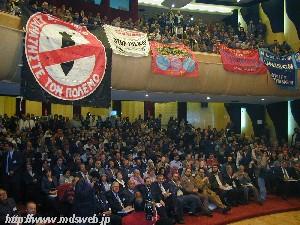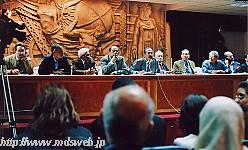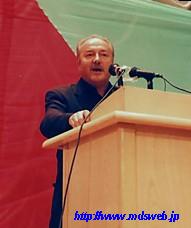From No.822, January 16, 2004 issue of WEEKLY MDS newspaper
Interview with Mamdouh Habashi, a Cairo Conference OrganizerWe Are One in Worldwide Fight against Capitalist Globalization and US Hegemony / Support Resistance in Iraq and Palestine | ||||||||
Mamdouh Habashi, an elected leader of the Preparatory Committee of the Second Cairo Conference against the Occupations of Iraq and Palestine, speaks to Weekly MDS on what achievements have come out of the gathering attended by more than 1,000 anti-war activists throughout the world. (December 17, 2003, in Cairo) -- What is the significance of the Second Cairo Conference?It is the first time to have a common coalition work in that big scale with the three main blocks of the political landscape in Egypt or in the whole Arab region. The three are the Marxists, the Nationalists and the Islamists with all the colors in each block. Therefore it is a big step. If you look sharply at the representation of the political landscape, you will find that these are the active political powers in the whole arena, excluding only the governing National Democratic Party. That means a lot. The second point is that it is the first time to arrange our common work without being backed financially from any donor or sponsor. It is a real popular organization, getting together and collecting small money and work support from each other. This is really a new form. -- Compared to the First Conference last year, what progress has this Conference made?
While the first one was against the war, the second one is against the occupation that already happened. The first one was strongly financed by Egyptian business people. We read their names and told the floor how much everybody paid. There were five people, two of them are in the Parliament. They were not exactly politically financing, but some kind like morally because these five businessmen have all their money mainly through the trade with Iraq. Therefore they wanted to show a gesture of recognition that they were not taking the good part of Iraq and so on. And all the invited figures were given the tickets and the accommodation, everything. The conference was held in a five-star hotel. That was really costly. The second one didn't have this possibility. I suggested to start the second one with low budget and without offering tickets or accommodation. The personalities were requested to come on their own, and we offered many possibilities of accommodation including to be a guest. This is a completely new form. Many of the members of the preparatory committee were very skeptic about that, saying "It can't work. We are not in Europe but in an Arab country. It may not be successful and would be rather much smaller than the first one." But I took the responsibility and said, "OK. I would manage that. Just believe me." -- What was your motivation to suggest such a conference with low budget?The whole motivation of making the Cairo Conference, even the first one and specially the second one, is first we need to find out the maximum area of common work among different political streams I mentioned before, to maximize the points of agreement, not to maximize the points of difference. Secondly we need to get a connection between our political work here and the worldwide movement. Because we consider ourselves a part of this international movement. We have to get this connection. This is a process and for that, we want to make out of the Cairo Conference events some continuous work to enlarge it horizontally and vertically. -- As to the turnout of participants, what is the difference?
We have been really surprised of the participation, not only from Egypt but also from abroad, from Arab countries and from the world. All our expectations have been exceeded or nearly doubled. Even the organizers in the preparatory committee were saying, "What's that? What have we done?" We located the invitations only for persons who were not connected to any regime. Therefore it was not an open invitation, but an invitation by name or for a symbol of any association like unions, syndicates or organizations of the civil society, and independent persons known by their attitude in the last time. But we got a lot more than we expected. We expected much less participation from abroad because of costs. It is not a small hall. Some of our colleagues in the preparatory committee, as they saw the hall before, said, "Oh, it would be very difficult to fill this hall." And also, we rented only 200 receivers for simultaneous translation because we expected that not more than 100 Arab-speaking would take these receivers and not more than 100 from abroad would, and the rest would be in no need for that because they speak the both languages. But it was a real shortage and people were sharing as you saw. Another point is the interest of the media. The Conference was broadcast directly by many Arab TVs. Even Egyptian TVs made coverage inviting a lot of star delegates and interviewing them. It was, let us say, too big to be ignored by the media. -- What elements of the Conference attracted such a big number of people?This is the work of the preparatory committee. We have spread that through emails and through mouth-to-mouth connections. I was personally very surprised when I got, especially in the last three weeks before the event, too many people who asked me to have an invitation. They were interested, they heard about it from anywhere. It was quite known here, and they wanted to share and join but they didn't have invitation. I was also surprised that this kind of advertisement is very efficient actually. But let us be realistic. It is efficient among the people who are already active more or less in the political arena. That means we are still not able to reach the big unpoliticized mass. This is the big deal. The mass media here in Egypt is still blocked by the regime, and you can't expect that the poor would get this information through a satellite. This is a problem. And also the common Egyptian newspapers had the news about that, but not real coverage. They were obliged to mention, but not interested in making a real coverage about the event because of the government oppression. They said, "OK. We can't ignore. We shall write something about it." But it's not the same kind of coverage like the others from outside. I think it is not a specific Egyptian problem. We are facing huge giant of media that is in the hand of the regime. -- You had many international delegates in the Conference. What impact on the liberation movements in the Middle East do you expect by having these people from abroad?The aim was, and still is, to let the people feel that they are a part of a global process, the enemies now are not only local but they are the same enemies worldwide, it is not specific Egyptian problem or even Arabic problem, and therefore there is the connection between what's happening in Iraq and in Palestine and the corporate globalization running now. It means to analyze any political problem nowadays, you are not able to analyze it only locally because the connections are now very complex. This is a new dimension, and it is also a process to let Egyptians be aware of this new dimension. This is not the situation 30 years ago, for instance, when every ordinary guy would think, "These are our problems. We have these problems. But the rest of the world have other problems or even they have no problems likely." So this is new settings of thinking. And it is our aim also to make the people think globally. The enemy now is global, and our problems are only a part of the world's problems.
Because it is new, it is still in the beginning. But it is very important, and also very quick in its development. The US hegemony is making this task for us easy in convincing people. It is not that difficult like 30 years ago to be aware of these connections. The connections have always existed, but nowadays to get the connections by ordinary people is not that difficult, to get the connections between crimes of war in Palestine and in Iraq and the corporate globalization and the hegemony of the US and Zionist states. It is obvious even for simple people. This is the only way today for all movements. If they do not recognize the necessity of getting together, they will never be able to achieve successes locally. This is some kind of a dialectic relationship between local and global. It should be parallel. -- What perspective do you have in the fight to end the occupation both in Iraq and in Palestine after the success of the Conference?Our target is only how to support their resistance. We are not able to resist ourselves, but we have to support them materially and culturally by awareness that here they are backed by the masses. This is very important for people in the resistance that they are not a victim of the manipulating media all over the world but here are the masses who are standing behind them and telling them that they are on the right way. This is the main support we can offer them nowadays. We have to give them the feeling they are supported not by the Arab regimes which collaborate with the enemies, but by the people on the other side. Another main point is to correct the picture of the Arabs or the Muslims in the world and to get the awareness in the rest of the world, specially in the West, that this is not a religious fight but a fight on interests and of geopolitical strategies and economic interest of oil and military hegemony, misusing the religion, not only Islam but also Christianity and Jews. We have to get that into the international media, the international consciousness and also here. You might have noticed that we have a lot of people who have been manipulated in their conscious by the media to think that we are in a fight with the Jews because we are Muslims. This kind of manipulation can be found on both sides. We have to start to explain that it is not a war between cultures like the Americans try to convince. It is not a war against terrorism. It is not a war between Muslims and Jews. It is exactly like the war in Ireland, which was not between Protestants and Catholics. In Kosovo also, it was not a war between Christians and Muslims. And this is a long-term process. You can't reach your aim by one or two conferences, but it's a long active work. -- In a long term are you convinced that the struggles against the occupations get victory?For sure. There is no other possibility. I think the history has shown that. Vietnam is an example. South Africa is an example. The revolution in Algeria was an example. It could take a decade or ten decades, but there is no avoidance for the victory of the people. I think all of the participants have recognized this. -- Can you give the Japanese people fighting to stop the military dispatch to Iraq a message of solidarity?Sure. The Arab people are really convinced that even if Japan would send soldiers to Iraq, there are big differences and huge gap between the Japanese regime and the Japanese people. The main thing the Arab people know about Japan besides Sony, Hitachi and Toyota is that the Japanese people are against war, against arms. The very rough picture of a Japanese person is the Japanese person cannot be a friend of war like the Americans. The normal picture of an American person here is a person who is fond of weapons and fond of fight. But it is the exact opposite with the Japanese people. Therefore we are convinced, even if they sent soldiers to support the Americans and to legitimate the American occupation, that is not the attitude of the Japanese people. I would be very glad if we have more messages from Japan to emphasize this gap between the regime and the normal people in terms of anti-war, anti-hegemony movement. What we have still questions in this sense, because our knowledge about Japan is vague and we don't have any other source but the mainstream media, is the attitude of the ordinary Japanese people against the anti-corporate globalization movement. Japan is a very important element in the corporate globalization. It would be nice to learn more about this movement within Japan, the relationship between militarizing the foreign policy worldwide and the economic process of the neo-liberal globalization. Therefore we consider an event like the Cairo Conference very useful to get this connection and deliver the information. People are eager here to learn more about Japan, because Japan's economy is very well-known here but the Japanese people's movement, the political landscape in Japan is something like ... [Mystery?] Yes, just unknown. So let us start a connection. |



